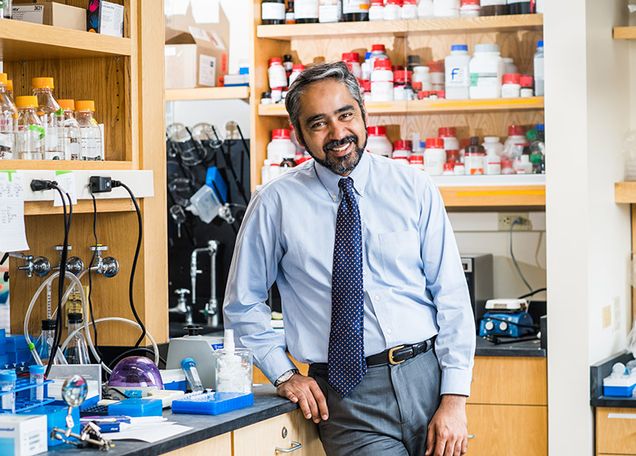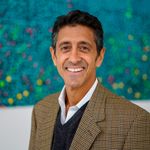Tackling Substandard Healthcare in Underserved Communities

Today we feature the work of Dr. Muhammad Zaman, professor of Biomedical Engineering (BME) at Boston University’s College of Engineering, and his team. The current focus of Dr. Zaman’s research is on systems biology, global public health, and applications of BME in the developing world.
Professor Zaman is dedicated to addressing the problem of systematic poor-quality healthcare in communities across the globe. We first spoke with him at our 2021 Innovator’s Journey event and have continued our conversation since. Highlights of our discussions are included below. You can also watch Dr. Zaman’s full presentation in this video.
Rana Gupta (RG): What is the need that you’ve identified and are trying to address?
Muhammad Zaman (MZ): I believe everyone should have access to quality medicine when they need it, no matter where they are. Social economic inequities limit access to quality medicines all over the world. Lack of access is especially prevalent in areas where long-term colonialism has led to depleted resources and a lack of agency in local communities.
RG: Your research led to an invention and a startup — PharmaChk — that you hope will address this. What is PharmaChk and how does it work?
MZ: I want to solve at least part of this issue by making quality medicines more accessible to those who need it. With PharmaChk, we aim to keep harmful and substandard medicines out of susceptible communities by detecting counterfeit drugs. Such drugs are responsible for more than 100,000 deaths in the developing world.
RG: How exactly does the product work?
MZ: PharmaChk is a portable system that screens for poor quality medicines by quantifying active pharmaceutical ingredient content. Validating the quality of drugs coming into these communities is a critical step.
RG: What path have you chosen to spread awareness of your innovation in hopes of getting it more widely adopted?
MZ: I have chosen two pathways in order to create awareness not just in companies, but also among the broader population. First, I am using the publication pathway. I have published a book, Biography of Resistance: The Epic Battle Between People and Pathogens, which I continue to talk about to raise awareness about dangerous aspects of our global health crisis. I also cover the many causes that have brought us to this point.
The second pathway is commercialization of PharmaChk to reach different markets. You and I are not the consumers of this project; instead it’s designed to fit into public health systems and the firms working with them. For public health, think of systems like the Food and Drugs Authority in Ghana — and then on the commercial side, firms like Merck KGaA.
RG: What would you say has been the most challenging part of pursuing this endeavor that the research industry did not prepare you for?
MZ: That your buyer, consumer, and beneficiary are not the same party! The buyer may be at Gates Foundation and the consumer may be in Pakistan. The beneficiary is the system as a whole. In some circumstances the buyer and consumer don’t even talk with each other. This is something that we do not learn in research.
Watch Dr. Zaman’s Presentation, From The Innovator’s Journey
RG: At our February Innovator’s Journey event, you took some questions from the audience. They were curious about how were able to build up your business expertise, and how you managed to spin out a new company while also working in your full-time role here at BU. Questions also touched on pursuing commercialization and assessing market need. Can you explain your approach?
MZ: This worked gradually and slowly, with accelerators, mentors, partners, and I-Corps programs. The good thing about Boston is that there are tons of resources and opportunities here to guide you. Also, I have been very fortunate to have an incredible team of people here who have been at the forefront and able to manage this.
I would say the idea was pulled from the market, versus us pushing it on the market. The original idea for pursuing this problem came from colleagues at USAID and other organizations, who were concerned about the challenges they were seeing when out in the field in developing countries. Existing tools either were too expensive or were not suited for the field, so they reached out to us to ask if we could work on the question of how to improve tech capacity for this central and important issue. How could we improve equity around medicine quality? So the market need was there.
BU’s Technology Development office (OTD) has been incredibly helpful in understanding this pursuit. Initially it took us some time to convince colleagues about the importance of global health work due to its unclear market. Your presence, Rana, has changed that profoundly, and we have gotten a lot out of our partnership. OTD has helped us in three key ways: First, by serving as a sounding board and as mentors when we brought the idea to the office; second, by helping us think through the unique challenges that this case entails due to the fact that the problem happens largely outside of the U.S. and outside of affluent parts of the world; and third, by providing both the intellectual and financial resources to help us get the idea off the ground.
RG: So what is the next step in terms of moving this idea forward?
MZ: To work closely with the likes of Merck KGaA. I think the COVID-19 pandemic has made us realize the importance of quality vaccines, which has prompted us think about quality in a broader sense. How do we build trust in the system? We don’t question a product purchased at CVS, so we have to build that trust with populations that have little trust; we have to address those roots of that distrust. That’s a long journey. In the presence of distrust, a COVID-19 vaccine could appear to be a government-backed underhanded initiative.

Our interests from the beginning have never been to create a blockbuster, money-making innovation; it’s always been driven by the desire to create more equity in global health. This belief — that we may be able to integrate this type of innovation into the health systems of low-income countries — has really kept us going. We want to make an impact on people. Again, for those in areas where this problem correlates with poverty and lack of agency.
We are collaborating with Merck KGaA, where there is common interest and appears to be an alignment of vision. They have a strong interested in global health and technologies such as ours.
RG: Final questions: what do you predict will be the most important innovations in your field in the next five years; and do you have any recommendations to your engineering colleagues and students?
MZ: I think for us, it would be technologies that are human-centric. Ethics and inclusion are playing an important role in how technologies help communities that have been left behind. There is strong global support for that. In terms of jobs, I think for us that inclusion, diversity, and ethics will be built into existing titles.
As far as advice: some of the best things that have happened to me at BU have been hanging out with the English, Gender Studies, and African Studies departments to learn about how they think. BU’s strength is the accessibility of different professors who know about cultural barriers and biases. I’d like to say to my Engineering colleagues: go to seminars in gender studies and critical race theory; understand why things happen the way they do; learn about a lack of “trust” in the system for example, especially if it applies to new medicines and technologies. In general, get out there and listen to the stories of people who live difficult lives.

Rana K. Gupta formerly served as director of faculty entrepreneurship at Boston University. He helped BU researchers bring technology and other research breakthroughs to the marketplace to increase their impact through programs and workshops, one-on-one consulting with faculty, educational resources, and community building among BU innovators.